高二英语外研选择性必修一Unit 6 Nurturing nature 1任务单
- 格式:docx
- 大小:15.90 KB
- 文档页数:2
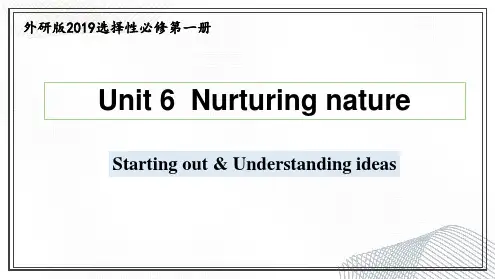
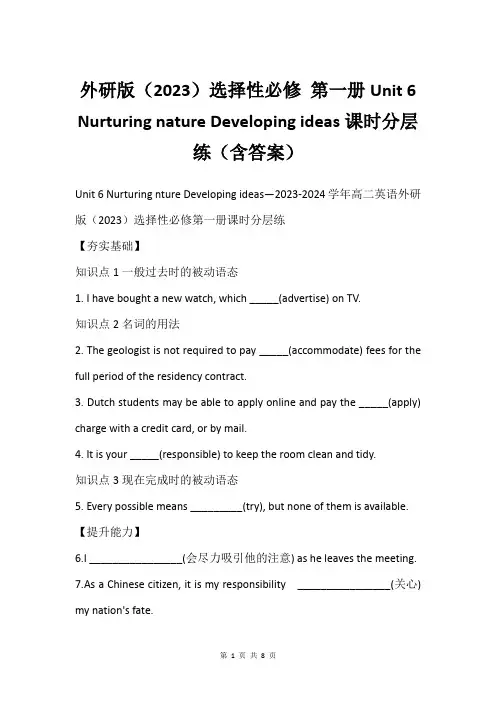
外研版(2023)选择性必修第一册Unit 6 Nurturing nature Developing ideas课时分层练(含答案)Unit 6 Nurturing nture Developing ideas—2023-2024学年高二英语外研版(2023)选择性必修第一册课时分层练【夯实基础】知识点1一般过去时的被动语态1. I have bought a new watch, which _____(advertise) on TV.知识点2名词的用法2. The geologist is not required to pay _____(accommodate) fees for the full period of the residency contract.3. Dutch students may be able to apply online and pay the _____(apply) charge with a credit card, or by mail.4. It is your _____(responsible) to keep the room clean and tidy.知识点3现在完成时的被动语态5. Every possible means _________(try), but none of them is available.【提升能力】6.I ________________(会尽力吸引他的注意) as he leaves the meeting.7.As a Chinese citizen, it is my responsibility ________________(关心) my nation's fate.8.Two-thirds of the French ________________(支持) limiting foreign imports into Europe.9.After the flood, the villagers tried their best to ________________ the village ________________(给……带来生机).10.To this day, it's unclear ________________(他是否是饮弹自杀) or was murdered.【核心素养】AChina is a country with a large population and a large number of resources. However, this also means producing a huge amount of waste. How we deal with waste has long been a problem, and garbage classification (垃圾分类) is something that both common people and the government should pay closer attention to.Garbage classification refers to a series of activities, including storing and sorting garbage according to certain standards. It makes sure that waste is reused again as many times as possible.Last month, my school did a survey about garbage classification. About 99 percent of the interviewees said that waste sorting was very important and should be focused on more, while only 1 percent doubted the importance of garbage sorting. Meanwhile, 80 percent of the interviewees said they took part in daily garbage sorting. When I asked, "Which is more important for society, environment or economy " Half ofthe participants stated that they were equally important.In my view, waste sorting is necessary. Almost all the participants said that each individual should sort the garbage they produced. Therefore, I believe it's a good idea for the government to pass a rule to encourage people to recycle their waste.As the saying goes, "Constant dripping (滴) of water wears away a stone." Nothing is to stop us from starting to sort our garbage by ourselves. The world will quickly become better if we all combine our efforts.1. According to the passage, what has long been a problemA.A large number of resources.B. Garbage collection.C. The way we deal with garbage.D. The polluted environment.2. Which statement is true about the surveyA. Almost all the interviewees thought waste sorting was important.B. Nobody doubted the importance of garbage sorting.C.8 percent of the people interviewed took part in daily garbage sorting.D. Half people considered environment more important than economy.3. What's the author's attitude towards waste sortingA. Unconcerned.B. Supportive.C. Negative.D. Doubtful.4. What's the main idea of the passageA. Only the government should be responsible for garbage classification.B. Garbage classification includes many activities.C. China is a large country with a large population.D. We can create a better world combining our efforts in sorting garbage. BI was at my parent's dinner table. Before me was a worn journal of thin and discolored pages. It was my grandfather's journal and now belongs to my father. My grandfather had passed away in the months leading up to my birth. I never got to visit the places he had frequented and the people who had been a part of his life's journey.I was now about to enter his world, through the words he had left behind. Within minutes, I was captivated by the power of the written words. In the magical script before me, I was transported to another age when food was an everyday art, planned, prepared and enjoyed in the company of others, and a time when people had the heart to pause their own lives to embrace(拥抱) each other's struggles. All this was conveyed to me in the beauty of the words that flowed together to connect with the writer's mind and understand the world they lived in.That kind of writing seems to be lost on us today. We have gotten used to writing in bite-sized pieces for a public looking for entertainment, and hungry for information. No wonder, there are nearly 200 million bloggers on the Internet and a new blog is created somewhere in theworld every half a second. Instead of adding to our collective wisdom, most of these writings reflect the superficiality(肤浅) and impatience of our day and age.This not only robs us of the skill of writing impressive essays, it also prevents us from exploring what is indeed important. Writing humbles(使谦卑) us in a way that is vital for our character growth, by reminding us about the limits of the self and our appropriate place in the vast flow of life.Writing frees us by helping us explore the unknown so that we really open up to magic of the world around us. I saw all of this in the writing of my grandfather. And I’ve seen it again and again in the writings of the greatest thinkers of humanity. Their writing reflects deep thought on issues of human importance.1. What does the underlined word "captivated" in Para.2 meanA. Puzzled.B. Frightened.C. Attracted.D. Defeated.2. In the author's grandfather's age, people ________.A. lived a hard lifeB. cared about each otherC. were fond of writingD. treated food as an art3.Why does the author begin the text with her grandfather's journalA. To show her respect for her grandfather.B. To present the importance of good writings.C. To express her interest in reading as well as writing.D. To raise the problem with today's writing.4. What is the writer trying to do in the last paragraphA. To discuss what good writing is like.B. To express her strong desire to learn writing skills.C. To stress the effects of her grandfather's journal on her.D. To show her admiration for her grandfather's writing.答案以及解析【夯实基础】1.答案:was advertised解析:句意:我买了一块新手表,它在电视上做过广告。
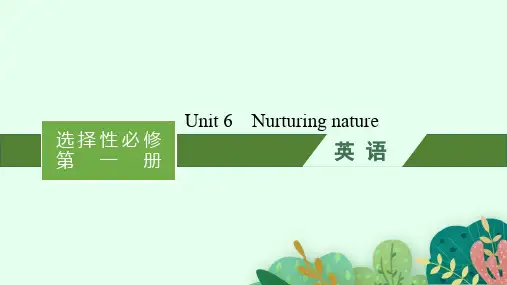


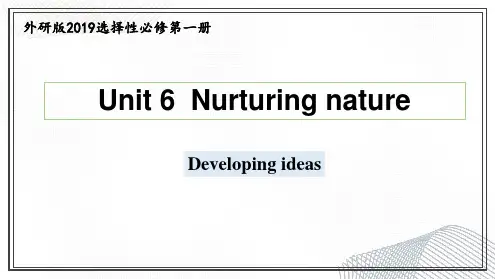
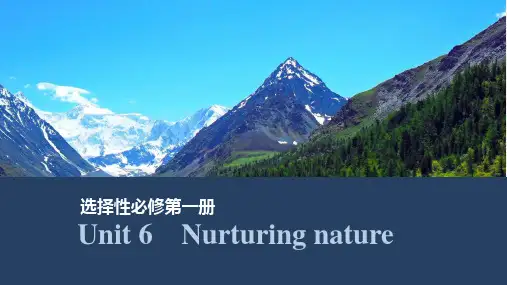
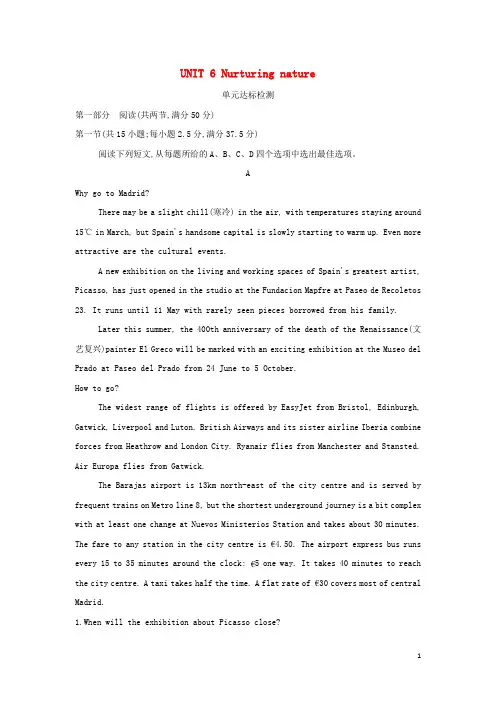
UNIT 6 Nurturing nature单元达标检测第一部分阅读(共两节,满分50分)第一节(共15小题;每小题2.5分,满分37.5分)阅读下列短文,从每题所给的A、B、C、D四个选项中选出最佳选项。
AWhy go to Madrid?There may be a slight chill(寒冷) in the air, with temperatures staying around 15℃in March, but Spain's handsome capital is slowly starting to warm up. Even more attractive are the cultural events.A new exhibition on the living and working spaces of Spain's greatest artist, Picasso, has just opened in the studio at the Fundacion Mapfre at Paseo de Recoletos 23. It runs until 11 May with rarely seen pieces borrowed from his family.Later this summer, the 400th anniversary of the death of the Renaissance(文艺复兴)painter El Greco will be marked with an exciting exhibition at the Museo del Prado at Paseo del Prado from 24 June to 5 October.How to go?The widest range of flights is offered by EasyJet from Bristol, Edinburgh, Gatwick, Liverpool and Luton. British Airways and its sister airline Iberia combine forces from Heathrow and London City. Ryanair flies from Manchester and Stansted. Air Europa flies from Gatwick.The Barajas airport is 13km north-east of the city centre and is served by frequent trains on Metro line 8, but the shortest underground journey is a bit complex with at least one change at Nuevos Ministerios Station and takes about 30 minutes. The fare to any station in the city centre is 4.50. The airport express bus runs every 15 to 35 minutes around the clock: 5 one way. It takes 40 minutes to reach the city centre. A taxi takes half the time. A flat rate of 30 covers most of central Madrid.1.When will the exhibition about Picasso close?A.On 23 March.B.On 11 May.C.On 24 June.D.On 5 October.2.Which airline operates flights from Manchester to Madrid?A.EasyJet.B.Ryanair.C.Air Europa.D.British Airways.3.What is the fastest way to reach central Madrid from the Barajas airport?A.Take a taxi.B.Take a city bus.C.Take Metro line 8.D.Take the airport express bus.BWhen Liberia was my home, they called it sweet. Sweet was the word I remembered the most during the war.When I was five, my father, two sisters and I fled from Monrovia, the capital city of Liberia, and headed north on foot among the panicky masses—a journey that ended in a village where we hid from flying bullets (子弹).Every dawn, my sisters and I joined my father and covered the pages of his small journal with words.My favorite word to write was “sweet”, one that had the power to numb the reality of our 6-month abandonment by peace and civilization.Eventually, we were considered the lucky ones: part of the wave of refugees who left Liberia in 1990 to settle in America. My mother studied at Columbia University at the time, and we made our new home in her dormitory while awaiting her graduation.My father who left early in the mornings looked for work or news of a possible return to Liberia, only to return home with nothing to give us but new words to write in notebooks. He quickly found that the education he received in Liberia was not good enough for an engineering job in America. So he took whatever job he could find to make sure we always had food on the table—and books.In 2011, I founded a children's book publishing company.It provides children's literature for the children of countries with low literacy (读写能力) rates andunderrepresented cultures by publishing culturally relevant books that have something meaningful to say to them. My hope is to give children the peace I was given through the words of my father, by allowing them to see themselves in literature.I also think it is important to provide books about foreign countries for children in America, to increase the overall awareness of the world outside them.I will never be able to give my father back the twenty years he spent educating us, or the home and life in Liberia he lost. I repay his sacrifice by honoring the education he fought for and offering my art to the world, with stories that make the histories of my people come alive, and with words to live by.4.What was the author's family life like in Liberia?A.Frightening but positive.B.Sweet and peaceful.fortable but boring.D.Adventurous and exciting.5.What can we infer about the author's father from Paragraph 2?A.He was crazy about reading.B.He regretted moving to America.C.He worked hard to raise his family.D.He tried to receive a higher education.6.Why did the author found the publishing company?A.To meet poor children's growing demands.B.To provide multicultural books for children.C.To support her father's books about Liberia.D.To help immigrants understand American culture.7.What does the author want to express in the last paragraph?A.Her pity for her father's suffering.B.Her thanks for her father's devotion.C.Her pride in working for her people.D.Her disappointment at the life in Liberia.CThe world's largest iceberg, named A68a, broke away from Antarctica's Larsen C Ice Shelf in July, 2017. It has since floated(漂浮)toward the island of South Georgia in the southern Atlantic Ocean. Satellite pictures show the iceberg has remained in one piece. It is about 150 kilometers long and 48 kilometers wide. It is traveling at one kilometer an hour and is on the way to hitting South Georgia in around 30 days.Right now is the time of year when seals and penguins spend a lot of time caring for their young. This means the distance that parents have to travel to find food is important. Scientists fear that if the iceberg hits the island, it could prevent the penguins and seals from reaching food supplies. That means they have to go a lot further. They have to go around the iceberg, or actually go further to find food. And that time is quite important in this particular period of their life cycle.Ecologists say an iceberg crash(碰撞)would also disturb materials settled on the seabed, possibly polluting the surrounding seas. As the iceberg melts(融化), it would also send large amounts of fresh water into the ocean. This could affect krill populations that are a major source of food for the island's wildlife. Besides, the iceberg could remain for 10 years and change the area's whole ecosystem. If some rare species fail in this area, their numbers globally are going to go down quite sharply.The breaking-off of icebergs from Antarctica is a natural process. But the process is changing with climate change. What we're seeing now is that the speed at which this is happening is increasing. And so, this might become more of a usual thing in the future. Right now, officials are hoping that changing weather patterns could direct the iceberg out into the open ocean, where it would, in time, break up and melt.8.What can we know about the iceberg A68a?A.It was hit by another iceberg and broke into pieces.B.It has been floating on the sea for less than 2 years.C.It is now more than 500 km away from South Georgia.D.It came into being because of a drop in water temperature.9.How will the iceberg probably influence the penguins and seals in South Georgia?A.By bringing other wildlife there.B.By slowing down their life cycle.C.By cutting off their ways to eating areas.D.By making the weather completely different.10.What is Paragraph 3 mainly about?A.The time period an iceberg could remain.B.The possible influence of an iceberg crash.C.The possible reason for the failure of rare species.D.The fresh water an iceberg could produce.11.What can we learn from the last paragraph?A.Floating icebergs will be more common.B.The iceberg will soon break up and melt.C.Icebergs have nothing to do with climate.D.Officials have planned to direct the iceberg.DAs people get older, the types and numbers of friends they have tend to change.As young adults, humans have large groups of friends.With age, they often prefer to spend their time with just a few close, positive individuals.Researchers long believed that this aging attraction toward meaningful relationships was unique to humans, but a new study finds that chimps (黑猩猩) also have similar tendencies.Rosati and her colleagues used 78,000 hours of observations made over 20 years from the Kibale Chimpanzee Project in Uganda.The data looked at the social interactions of 21 male chimps between 15 and 58 years old.The researchers only studied male chimps because they show stronger social bonds and have more social interactions than female chimps.Researchers found that wild chimpanzees share a similar pattern of social aging with humans.Rosati says, “They prefer strong, mutual social bonds and interact with others in more positive ways as they get older.” The older chimpanzees preferred spending more time with chimps that they had become friends with over the years.Theywould sit close to these long-time companions and groom (梳毛) each other.By contrast, younger chimps had more one-sided relationships where they would groom a friend, but the action wasn't returned.Older male chimps were also more likely to spend more time alone.The researchers said that they showed a shift from negative interactions to more positive ones, preferring to spend their later years in non-confrontational (非对抗性的), positive relationships.Researchers call the preference a “positivity bias”.Researchers theorize that chimps, like humans, are able to change their social focus as they age.“We propose that this aging pattern may be the result of shared changes in our abilities to regulate our emotions with age,” Rosati says.“This shared pattern between chimpanzees and humans could represent an adaptive response where older adults focus on important social relationships that provide benefits and avoid interactions that have negative consequences as they lose competitive fighting ability.”12.What does the new study find about chimps?A.Male chimps show more interactions than fem-ales.B.Old chimps don't care about friends as much as young ones.C.Chimps concentrate more on meaningful relat-ions with age.D.Chimps share aging problems similar to human beings.13.How did Rosati and her colleagues conduct their research?A.By studying the data provided by other researchers.B.By making scientific investigations and observations.C.By setting up models on the computer in the lab.D.By monitoring both the humans' and chimps' behavior.14.What do researchers think causes this aging attraction to meaningful relationships?A.Inability to regulate emotions.B.Eagerness to build closer relationships.C.Loss of competitiveness in strength.D.Failure to adapt to the changeable surroundings.15.Where does this text probably come from?A.A short story collection.B.A popular science magazine.C.A graduate research paper.D.A biology textbook.第二节(共5小题;每小题2.5分,满分12.5分)阅读下面短文,从短文后的选项中选出可以填入空白处的最佳选项。
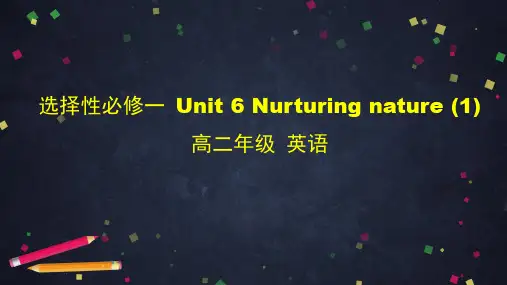
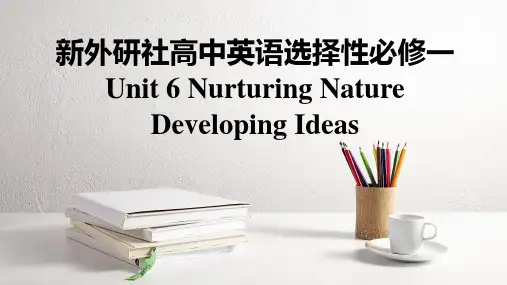
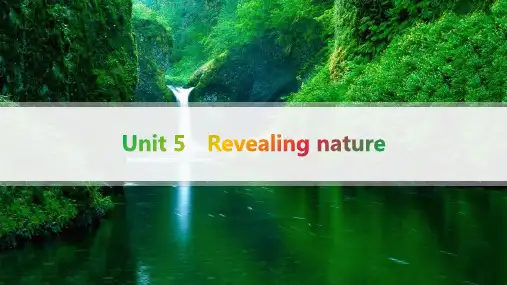
Unit 6 Nurturing naturePeriod 1 Starting out and understanding ideasTeaching design【Textbook Analysis】This part presents a text reflecting the theme of the unit, and the article is a travel note. The author describes a journey to the sky railway and recalls that the construction of the Qinghai-Tibet railway was always based on the premise of ecological protection, and that it overcame numerous difficulties and finally completed the world's first "impossible" railway project. He expressed his pride as a builder, and also expressed the environmental protection idea that the project construction should take ecological protection as the premise. In the pre-reading activity, there are four pictures which are related to the theme of the unit. The pictures are Huanglong Scenic Area in China, Iguazu Waterfall on the border between Argentina and Brazil, Kilimanjaro in Tanzania and Uluru Rock in Australia, respectively, to attract students' interest and pave the way for the study of the lesson. In the process of dredging the text, summarize the general idea of each paragraph. After reading the text, deepen the understanding of the text through several questions given. Appreciate the text, explore the meaning of the theme, cultivate the ability of reading and thinking.【Teaching Aims &Core Literacy】1. Lead the students to lock the key words through skimming, get the main information of the passage, feel the special significance of the sky railway to the author, and grasp the author's writing intention2. Lead the students to find out the main details in the article through intensive reading, that is, the various difficulties overcome in the construction process of Qinghai-Tibet Railway and the impact of Qinghai-Tibet Railway on the lives of local residents, feel the greatness of the builders and stimulate national pride3. Guide the students to perceive the language features of the article through reading the passage, learn and master the topical vocabulary and phrases in the text, and use the vocabulary to introduce the Qinghai-Tibet Railway. 【Teaching key and difficult points 】1. Lead the students to understand the passage, understand the author's writing intention, and understand the main idea of the passage2. Guide students to understand the stylistic features of travel articles3. Guide the students to grasp the reading skills of skimming and intensive reading4. Guide students to introduce the Qinghai-Tibet Railway by themselves by using the vocabulary and phrases they have learned and mastered in this passage【Studying Methods】1.Teach the students how to master a passage quickly2.Let the students retail the passage by using their own language and the vocabulary they learned in this passage3.Teach the students how to communicate with others and develop the sense of teamwork【Teaching procedure】Step1 Starting out1. Two questions are used to discuss the nature of human beings, leading to the following article on The Sky Railway1)What nature can do to us humans?2)What can we humans do to nature?2. Use four common-sense questions about Qinghai-Tibet Railway to make students understand the relevant content of Qinghai-Tibet Railway in a simple and comprehensive way1.)Which is the highest railway in the world?A. The Trans-Siberian Railway.B. The Qinghai-Tibet RailwayC. The Chengdu-Kunming Raway.2.)In which year was the completed Qinghai-Tibet Railway put into operation?A. 1984B. 2001C. 20063)Which of these stations is not on the Qinghai-Tibet railway?A. LhasaB. GolmudC. Lanzhou4.)Which of these natural World Hertage Sites does the Qinghai-Tibet Railway pass by?A. Xinjiang Tianshan.B. Qinghai Hoh XilC. South China KarstStep 2 Learn the new important words1. ___adv. 平稳地2. ___adj.巨大的3. ___adj.脆弱的4. ___n.地标5. ___adj.壮丽的6. ___n.永久冻土层7. ___adj.西藏的 8. ___n.羚羊9. ___n.空闲,闲暇 10. ___空闲时11. ___n.湿地 12. ___n.草原13. ___n.辐射 14. ___adj.如镜面般的15.___ v.徘徊 16. ___n.风景,景色17. ___n.高原 18. ___n.经济Step 3 Briefly introduces the relevant information of Qinghai-Tibet Railway.Step 4 Read the passage and find out the main idea of each paragraph. (skimming)Para.1 I'm about to travel along qinghai-tibet railway.Para.2 How to protect the delicate ecosystem was the top concerns of various difficult engineering challenges.Para.3 Thirty-three passages were built under qingshuihe bridge to allow animals move safely and freely.Para.4, Bridges were built to prevent damage to wetlands and grasslands. Para.5 Several oxygen-making stations were tructed for railway workers. Para.6 A twenty-kilometre wall along the lake were built to protect cuona lake from construction waste.Para.7 I am proud that we built our “impossible” railway, and did so with the care that the environment deserves.Step 5 Ask students to tease out the paragraph structure of the passage. Step 6 Lead students find out the specific details in the passage and fill theblanks in ppt(scanning)Step 7 Teach students some grammar in this passage.1)key words and expression2)grammar structure。